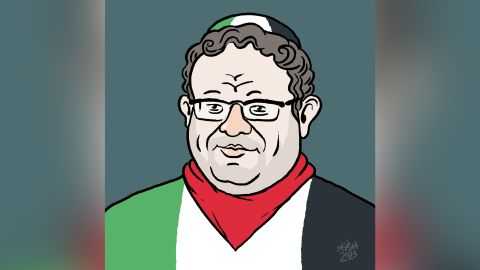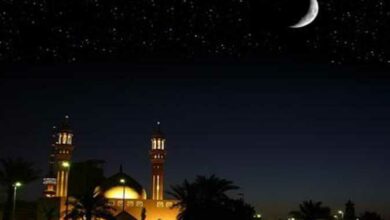
Just over a decade ago, the Palestinian flag hung alongside Israeli and American flags at the Israeli prime minister’s residence, when Benjamin Netanyahu and Palestinian Authority President Mahmoud Abbas shared a historic handshake.
Today, Netanyahu is back in power and Abbas never left, but many other things have changed, including Israel’s attitude toward the Palestinian flag.
This month, new Israeli National Security Minister Itamar Ben Gvir ordered police to take down Palestinian flags in any public place in Israel, claiming they are a rallying symbol for terrorists.
At least one artist felt forced to respond to Ben Gvir’s decree.
As soon as he heard about the minister’s order, Tel Aviv-based visual artist Michael Rozanov drew himself in the colors of the Palestinian flag and made the artwork his Facebook profile picture.
“It’s ridiculous, you want to take down flags? What if I am a flag, what would you do? Would you put me down because I’m wearing certain colors?” said Rozanov, known as Mysh. “So I drew this illustration that took me 10 minutes.”
He didn’t expect it to attract much attention, but dozens of Israelis joined Mysh, asking him to draw their profile pictures with the Palestinian flag in the hope of making some impact.
More than 100,000 people turned out in Tel Aviv on Saturday night, the latest – and largest – in a series of weekly protests against legal reforms Netanyahu’s allies are planning.
But not all Israelis welcomed Mysh’s drawings.
One commenter on Facebook accused Mysh of “spreading a flag of hate,” adding: “What a bummer.”
Another said: “What does this want to say? That it is now cool to belong to a nation that has surrendered to its terrorist leaders? Hamas doesn’t want peace with us, what’s not clear?”
Mysh made a point of replying to each comment to explain and even try to convince his critics.
But he believes that Ben Gvir’s attempt to publicly ban the Palestinian flag – which is technically legal to fly in Israel – is a continuation of the direction Israel has been moving toward since its founding in 1948.
“It’s definitely a step forward for the craziness, but nothing surprising,” Mysh said. “I think what we see now is the shattering of this illusion that most Israelis try to maintain, that they can live in a liberal democracy that respects all human rights, while simultaneously robbing five million people more of the same basic rights,” he said, referring to the Palestinian population.
An artist who uses different media – film and animation, illustration and comics – to address social and political issues, as well as sexuality and gender, Mysh came to Israel as a teenager from Latvia in 1993 and served in its army for three years.
But one day doing his reserve service at an Israeli checkpoint in the Jordan Valley, he says he had a powerful insight into the Palestinian experience.
“The only reason that checkpoint existed was to make the life of the people in the village more difficult,” Mysh said. “We were checking the same people twice every day. They were mostly mothers who take their children to kindergarten on the other side of the village.”
“There was a day when I was standing there with my gun and another soldier was checking ID cards, and suddenly I realized that I am a grown-up man who points a gun at a 3-year-old child. And I say to myself: ‘I’m not really pointing at him. I’m just standing like this.’ Yeah, but he doesn’t know that. What he sees is this scary creature pointing a f**king gun.”
“It suddenly hit me, the perspective of the other side, which is this child that twice a day sees this monster pointing a gun at him. What are the chances that this child grows up being ready to see me as a human being as I am? How can I expect him to perceive me as a human being? Then I decided I’m out of this. I’m not doing this anymore,” Mysh said.
Mysh sees a direct connection between Israel’s military checkpoints and Ben Gvir’s attempt to essentially ban the Palestinian flag, which is likely to be tested in court.
“Every oppressive system is a weak system because it can’t withstand any friction,” Mysh argued. “It needs to enforce a huge amount of violence to avoid friction.”
That is what Ben Gvir is trying to achieve, Mysh said: “It is an idea that in order to achieve our national identity, we need to take it away from other people.”



